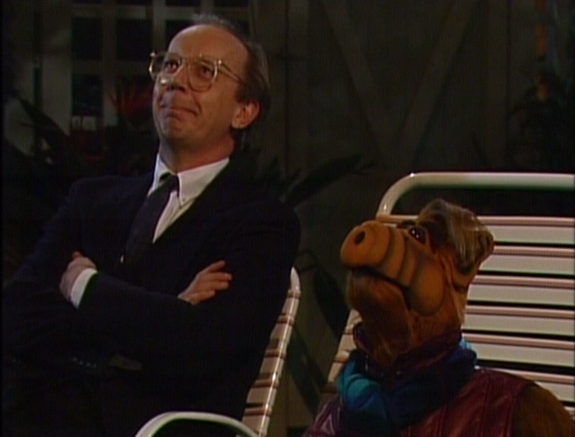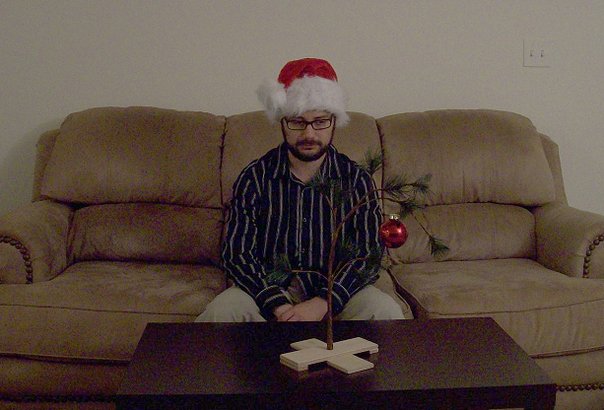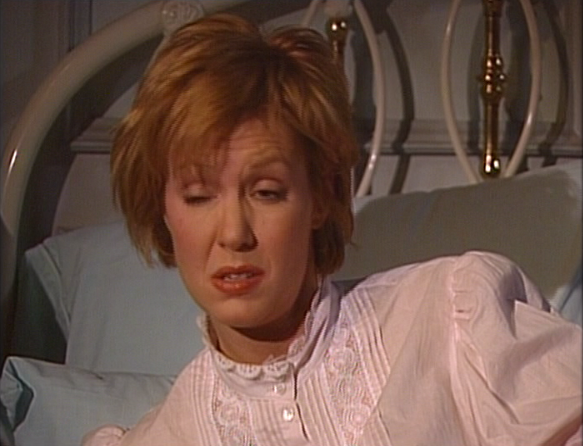And, somehow feeling as though it went both way too fast and way too slow, season two is behind us. This puts us at the midpoint of the project, with season three’s 25 episodes, season four’s 24, and the Criterion Collection director’s cut release of Project: ALF still to come.
And…I’ll talk about the season itself shortly. For now, a few general reflections on the project itself.
The value that this series has had to me as a writer is immense. I have no idea what any of you get out of it as readers, and for that I almost feel guilty.
When I first chose ALF to cover, it was because of a few things. One: well, you voted for it. But even if you hadn’t, I probably would have covered it at some point, because two: it’s a show I remember liking as a kid that seems positively insane as of now.
The idea of a prime-time puppet show on American network television seems like a truly foreign idea, but it wasn’t. It happened. And, in spite of how bizarre that now seems, it was also extremely popular.
It’s not entirely without peer, though. The most obvious forerunner would be The Muppet Show, which similarly featured puppets interacting with humans, and post-ALF we’ve had things like Crank Yankers and Mystery Science Theater 3000. In both of those latter cases, however, the puppets were, by their very nature, part of the joke. What we were watching was deliberately absurd, and sticking an obvious puppet in the middle of the proceedings was a method of making that very clear to the viewer.
ALF hews more closely to — and is utterly indebted to — Jim Henson’s immortal creations. The fact that ALF is a puppet is never the joke. We’re meant to see him as a character in his own right, as well-rounded and loveable as any other classic sitcom creation. Archie Bunker, Ralph Kramden, Mary Richards, “Hawkeye” Pierce, ALF.
At least, that’s what Paul Fusco wanted, and, to some extent, what he must have believed. Which leads me to the third reason I’m glad to cover ALF: it’s supremely instructive from a writing standpoint.
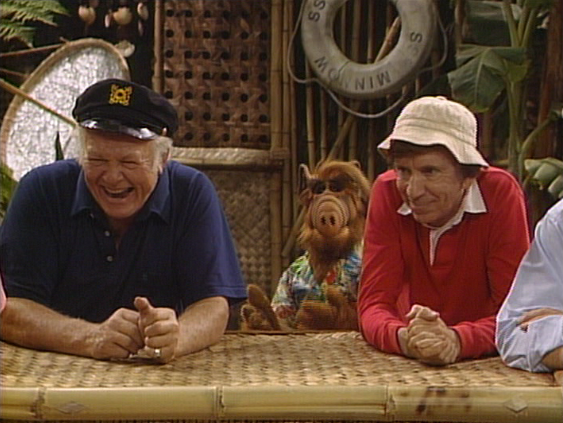
For a show that’s rightly remembered for its novelty value alone, ALF could not serve as a better case study when it comes to humor writing. Characterization, dialogue, world-building, social satire, emotional stakes, continuity, interpersonal relationships, evolving roles and conflicts…all of these things are woven into ALF‘s weekly routine, some of them by nature of it being a sitcom, others by deliberate choice.
And, I don’t need to tell you after 50 of these fucking reviews, they’re nearly always bungled spectacularly.
That alone would make ALF a good case study. The distance between what the show wishes to achieve and what it actually achieves leaves so much room for exploration…for consideration…for finding the loose ends and pieces that don’t fit together, and trying to figure out why that is.
But what makes it a great case study is the fact that, tantalizingly often, the show does accomplish what it sets out to do. The pieces do fit. The show, however briefly, works.
That’s an achievement, and it’s a fascinating one to me. Especially since (with very few exceptions) ALF getting something right amounts to nothing more than any decent sitcom achieves regularly: a good joke, and / or some competent storytelling.
On a decent sitcom, however, and certainly on the great ones, such achievements seem to happen effortlessly. The cameras are on, the cast reads their lines, and it’s as simple as that. It doesn’t smack of effort; it feels instead like we’re fortunate enough to watch talented people doing what comes easily.
On ALF, you can practically see the gears grinding. You can see the cast floundering, the writing working against itself, and the logistical incompetence pulsing in the background of every scene.
It makes the small triumphs (a funny line, a snatch of good acting) seem sweeter, in an illusory way, and it makes the massive failures that much more frustrating, because we see them coming. We see the smoke coming out of the machine. We see the parts falling off. And nobody working on this thing seems to want to fix it.
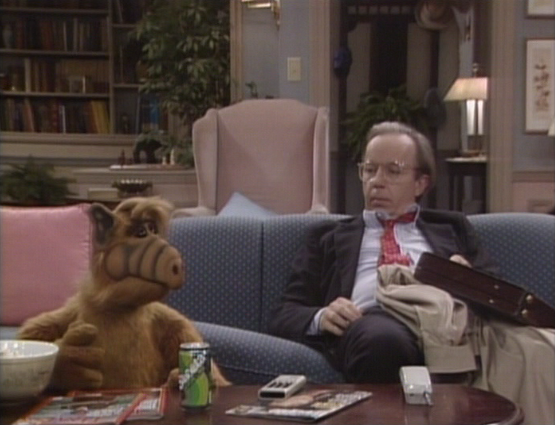
And I love that, in a way. There are a wealth of titles that I love across all media that are riddled, to varying extents, with flaws. The Life Aquatic With Steve Zissou. Majora’s Mask. Every single Pink Floyd album. But those flaws exist in spite of artists working extraordinarily hard to correct them, account for them, and control them. The flaws don’t puncture the experience; they simply serve as (often unfortunate) reminders that human beings, fallible, imperfect, up against deadlines, dealing with personal issues, are driving themselves crazy (sometimes literally) to produce the best work they can.
For this reason, ALF is something of a godsend. If a work of art aspires to nothing, there’s very little we can learn from it; the team doesn’t care, but they didn’t try to achieve anything anyway. If a work of art aspires to something and the team tries hard to get it there, the flaws become harder to parse, to dissect, to examine, as our attention is drawn — rightly — to what is working, and to what we are feeling.
ALF is an oddity in the middle. It aspires to much, but has a creative team that’s perfectly content to say “fuck it” and watch the wheels fall off.
Sure, I complain about the show and pick it apart, but it’s because there’s a benefit to doing so. It’s our chance to operate on a translucent cadaver. We can learn so much from a show that’s convinced it’s great and therefore puts forth no effort to actually be great.
That’s why, at this midway point, I’m more excited than exhausted. And I hope you are, as well. While I’ve had more people tell me to press on with ALF than I have had express disappointment that I’m doing so, those latter voices still make me feel bad. Perhaps it’s a question of balance, and I need to just dedicate myself to doing more, different kinds of writing here. In the coming year, I intend to do exactly that, so hopefully that will help.
But I’ll plow through the rest of ALF, because I’ve seen the positive effects it’s had on my writing already. The study of what so clearly doesn’t work makes it easier to see faint echoes in what I produce on my own, which means I can correct those issues much more quickly and organically. In short, the more time I spend with Willie Tanner, the less likely his mumbly brand of irritating horseshit is to sneak into something I’m writing.
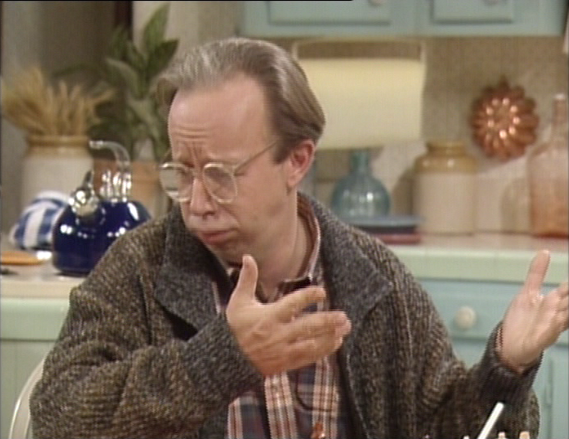
As much as I give this show guff about its characters, season two did a very good — if equally inconsistent — job of trying to develop them.
I’d say there were five truly good episodes in season two, and the first three were all about individual members of the Tanner household. “Working My Way Back to You” was the first, and it centered on Kate. By the end of season one, Kate was deeply entrenched as the only Tanner who acted remotely human, so while a Kate episode could have easily coasted on what we already knew, “Working My Way Back to You” did something admirable and reversed the dynamic she has with ALF, showing us another side of both characters, and leading to one of the best episodes yet.
Then there was “Oh, Pretty Woman,” which centered on Lynn. While the beauty pageant setup skirts worryingly close to reminding us that “fuckable” has heretofore been her only consistent personality trait, it’s packed wall to wall with great lines, and we see a vulnerable, desperately hopeful side of the character that makes her seem a lot like the flesh and blood teenagers that actually occupy the world we know.
The third was “Night Train,” which took the single most problematic character in the entire show — which is certainly saying something — and gambled hard on him. Honestly, it’s something I never would have expected the show to pull off. It would have been enough of an achievement to portray Willie as anything we’re already supposed to believe he is (husband, father, son, brother, social worker, anything other than erectile dysfunction on legs really), but to position him in the center of an episode-long emotional journey that concludes with a renewed appreciation for himself…I would have said that’s guaranteed to fail.
And yet, it doesn’t. It works. It works so fucking well that it renders the lousy episodes that much more frustrating.
The two other good episodes in season two are also character-based, in the sense that they reprise the best characters from season one. “We Gotta Get Out of This Place” sees the long-overdue return of ALF’s blind friend Jodie, and “I’m Your Puppet” culminated in a surprise second session with Dr. Dykstra. Both of these episodes, as a kind of bonus, delve into who / what ALF is, with Jodie helping us to explore ALF the character, and Dr. Dykstra allowing us to explore ALF the television show.
Many of the really fuckin’ bad episodes attempt to develop character, too. “Take a Look at Me Now” shattered and rebuilt Mrs. Ochmonek, “Something’s Wrong With Me” was about the culmination of Kate Sr.’s Love Quest, “Isn’t It Romantic?” reenacted Willie and Kate’s honeymoon, and so on. And while none of these episodes were even watchable, I admire what they attempted to do: flesh out the world built, however shoddily, by season one.
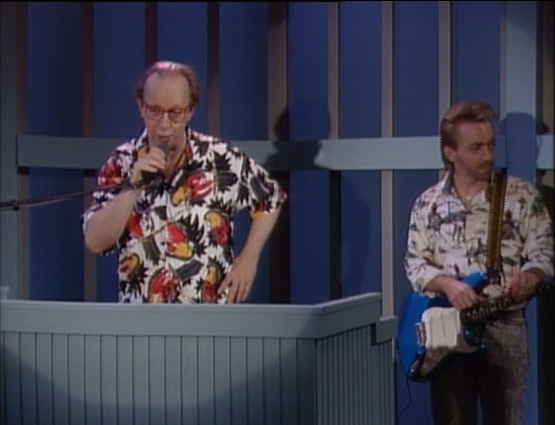
I’m pretty sure it’s been unanimously declared ’round these parts that season two is as good as it gets. And while I’ll wait until I finish the next two to pass judgment, I can at least compare it against season one. Overall, sure, I’d say it’s better.
For starters, there were five good episodes in this batch, as compared to the previous season’s three. And the average season two episode certainly had better lines and gags, which is pretty important for a comedy show.
But that also might be the problem. Season one was certainly the shakier of the two, but, to give credit where it’s due, it also attempted a lot of really interesting things. Insane things, yes, but there’s a kind of thrill to watching a show shitty enough that it features an alien prank calling the president, singing about fucking a teenager, stealing cars, writing for soap operas, and staging an episode-long pastiche of Rear Window. These were terrible, terrible episodes, but I remember them better than most of season two simply because they were mad enough to stick with me. Much of season two, by contrast, is neither bad nor good enough to be remembered at all.
The wackadoo approach to season one plotting was fun. I hated the episodes, but I can guarantee I’ll be making jokes about ALF threatening President Reagan on the Air Force One shitterphone for the rest of this series, while I doubt I’ll ever feel compelled to remind you of Kate Sr.’s wedding. And sure, it’s stupid that they introduce Mr. O’s cousin Oliver to pop up whenever they need someone of the same species to squeeze Lynn’s boobies, but it’s not the same kind of stupid as ALF stealing a riding mower and implicitly wreaking tame havoc all over Los Angeles.
The one shining exception to this — and you know what I’m going to say before I say it — is “ALF’s Special Christmas.”
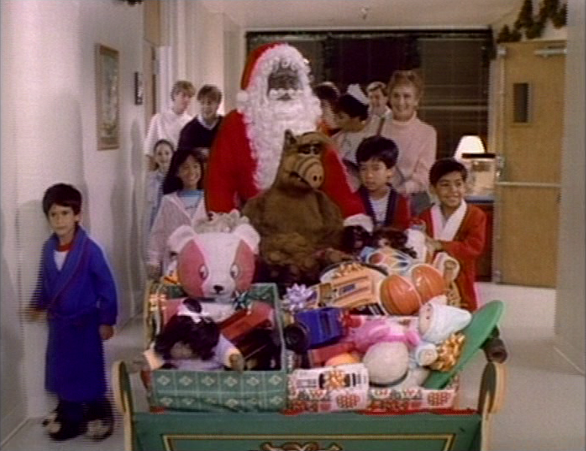
I mean come on. Just look at this shit.
This pandering, obnoxious, insulting kick in the emotional nutsuck not only hearkens back to the worst impulses of season one, but it surpasses them in every conceivable way. Its self-importance is suffocating from the very first frames, with the higher film quality, new title card, and super-sized running time all promising that you aren’t watching ALF; you are watching a major television event.
As much as I hated it, it’s memorable for that reason alone. It’s a prime example of an episode falling apart as we watch, straining beyond its own abilities to reach something it should have never bothered with, and splitting open to spill its innards everywhere for the world to see.
This is the kind of bad episode that circles back around to being worth watching. Not because it’s good, but because when you have a space alien saving Christmas from suicidal black Santas and ineffectual gynecologists, you do sort of have to watch. You won’t come away from it feeling the warmth that Paul Fusco intended, but you’ll talk about it, laugh about it, and years later probably even reflect upon it.
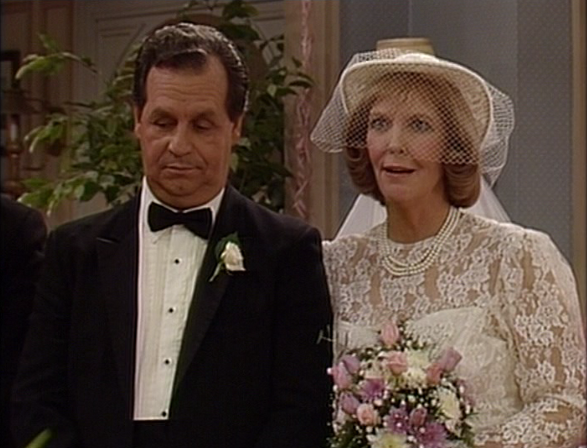
But that, sadly, is a bonkers exception to the forgettable norm. While season two is overall better, it rises from “bad” to simply “bland.” Of the two, there’s a kind of honor to the former. You’ll remember everyone who flips you the bird, but almost nobody who politely nods. It’s improved, but not enough to really count.
Looking back on the season as a whole is frustrating, because it hit both higher highs and lower lows than season one did…yet it didn’t do either consistently enough to carve out an identity for itself.
It did, however, do a respectable job of trying to find humanity in the hollow, braindead caricatures we met in season one. It failed as often as it succeeded, but the impulse was sound. Al Jean and Mike Reiss ran the show this time around, and their mission seemed to be to actually introduce us to the characters that we ostensibly “met” last season.
It’s not their fault that they inherited a world of lost causes. It is, however, to their great credit that they managed to redeem any of them, however temporarily.
With that, we have a few more bonus features before we move on to season three. And there, I get the feeling, I’ll find myself longing for these heady days of forgettable weekly blandness.
Roll on, season three.
